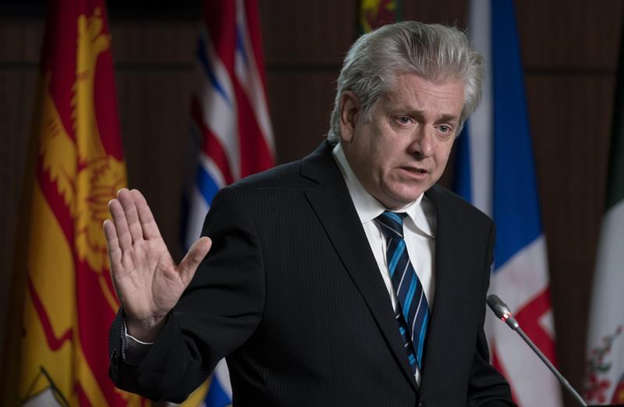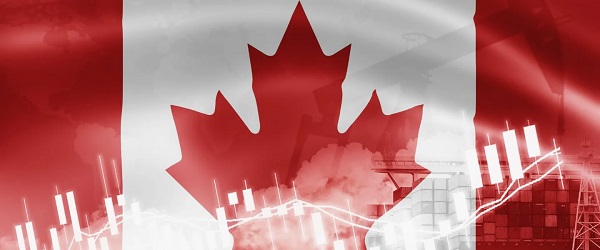Energy
Proposed legislation seeks to suppress speech about climate change and fossil fuels

NDP MP Charlie Angus
From the Fraser Institute
Canada is a constitutional parliamentary democracy where differences of opinion are to be resolved through elections, which people are persuaded by words and ideas, not threats of violence. Stripping people of the right to express themselves freely will introduce violence into the democratic process, disenfranchising some people and disenchanting others.
It’s rare, in today’s political world, for someone in power to whip off the velvet glove and show the iron fist beneath. It’s a bit gauche for our times. But that’s what happened recently when federal NDP natural resources critic Charlie Angus tabled a member’s bill that would clap anyone who says negative things about the government’s fossil-fuel-phobia into the pokey—and rob them on the way to jail. We’re not talking about a slap on the wrist, but about million-dollar fines and years in jail for simply expressing a positive thought about fossil fuels. So much for the fundamental freedom of expression in Canada.
Angus’ Bill C-372 would fine and jail people for the most innocuous of speech relating to climate change or fossil fuels. Even daring to speak the obvious truths such as “natural gas is less polluting than coal” could land you in jail for one year and cost you $750,000. If you produce fossil fuels and are found guilty of “false promotion,” you’d face two years in jail and a $1.5 million fine.
Enacting such speech restrictions would be destructive of the fabric of Canadian society, and even though this member’s bill (like most) will go nowhere, it should trouble Canadians that we’ve reached a level of political discourse where members of Parliament feel they can blatantly propose stripping Canadians of their freedom of expression, obviously convinced they’ll not pay a price it.
Specifically, Bill-372 and its pernicious idea of speech control would cause harm to two major elements of Canadian civilization—our democracy, which depends on the free exchange of ideas as Canada elects its leaders, and our mixed-market economic system where actors in the market require a free flow of information to make informed decisions that can produce positive economic outcomes and economic growth.
Let’s start with that democracy thing. Canada is a constitutional parliamentary democracy where differences of opinion are to be resolved through elections, which people are persuaded by words and ideas, not threats of violence. Stripping people of the right to express themselves freely will introduce violence into the democratic process, disenfranchising some people and disenchanting others. Canada already has to work hard to promote engagement by the public in the political process. Things like Bill C-372 would not make this easier. A less politically engaged public cedes ever more power to entrenched politicians and political activists, and leaves power in the hands of smaller minorities with extreme enough views who think opposing ideas must be suppressed with force.
Regarding free speech, consider this. Without a robust mixed-market economy, the voluntary exchange which leads to economic activity does not happen. Productivity declines and scarcity, the eternal scourge of humanity, resurges and people suffer. Freedom of expression is central to the operation of market economies. People must be free to share information about the value of things (or lack thereof) for decisions to be made, for prices to manifest, and for markets to function effectively. Without open communication in markets, diversity of goods and services will diminish as some goods and services won’t be promoted or defended while others are freely to advertised.
Bill C-372 should and likely will die an ignominious death in Parliament, but all politicians of all parties should denounce it for what it is—an attempt by government to suppress speech. Unlikely to happen, but one can always hope for sanity to prevail.
Author:
Alberta
Nobel Prize nods to Alberta innovation in carbon capture

From the Canadian Energy Centre
‘We are excited to bring this made-in-Canada innovation to the world’
To the naked eye, it looks about as exciting as baking soda or table salt.
But to the scientists in the University of Calgary chemistry lab who have spent more than a decade working on it, this white powder is nothing short of amazing.
That’s because the material they invented is garnering global attention as a new solution to help address climate change.
Known as Calgary Framework-20 (CALF-20 for short), it has “an exceptional capacity to absorb carbon dioxide” and was recognized in connection with the 2025 Nobel Prize in Chemistry.
“It’s basically a molecular sponge that can adsorb CO2 very efficiently,” said Dr. George Shimizu, a UCalgary chemistry professor who leads the research group that first developed CALF-20 in 2013.
The team has been refining its effectiveness ever since.
“CALF-20 is a very exciting compound to work on because it has been a great example of translating basic science into something that works to solve a problem in the real world,” Shimizu said.
Advancing CCS
Carbon capture and storage (CCS) is not a new science in Alberta. Since 2015, operating projects in the province have removed 15 million tonnes of CO2 that would have otherwise been emitted to the atmosphere.
Alberta has nearly 60 proposed facilities for new CCS networks including the Pathways oil sands project, according to the Regina-based International CCS Knowledge Centre.
This year’s Nobel Prize in Chemistry went to three of Shimizu’s colleagues in Japan, Australia and the United States, for developing the earliest versions of materials like CALF-20 between 1989 and 2003.
Custom-built molecules
CALF-20 is in a class called metal-organic frameworks (MOFs) — custom-built molecules that are particularly good at capturing and storing specific substances.
MOFs are leading to new technologies for harvesting water from air in the desert, storing toxic gases, and capturing CO2 from industrial exhaust or directly from the atmosphere.
CALF-20 is one of the few MOF compounds that has advanced to commercial use.
“There has been so much discussion about all the possible uses of MOFs, but there has been a lot of hype versus reality, and CALF-20 is the first to be proven stable and effective enough to be used at an industrial scale,” Shimizu said.
It has been licensed to companies capturing carbon across a range of industries, with the raw material now being produced by the tonne by chemical giant BASF.
Carbon capture filter gigafactory
Svante Inc. has demonstrated its CALF-20-based carbon capture system at a cement plant in British Columbia.
The company recently opened a “gigafactory” in Burnaby equipped to manufacture enough carbon capture and removal filters for up to 10 million tonnes of CO2 annually, equivalent to the emissions of more than 2.3 million cars.
The filters are designed to trap CO2 directly from industrial emissions and the atmosphere, the company says.
Svante chief operating officer Richard Laliberté called the Nobel committee’s recognition “a profound validation” for the entire field of carbon capture and removal.
CALF-20 expansion
Meanwhile, one of Shimizu’s former PhD students helped launch a spinoff company, Existent Sorbents, to further expand the applications of CALF-20.
Existent is working with oil sands producers, a major steel factory and a U.S.-based firm capturing emissions from other point sources, said CEO Adrien Côté.
“The first users of CALF-20 are leaders who took the risk of introducing new technology to industries that are shrewd about their top and bottom lines,” Côté said.
“It has been a long journey, but we are at the point where CALF-20 has proven to be resilient and able to survive in harsh real-world conditions, and we are excited to bring this made-in-Canada innovation to the world.”
Business
Bill Gates walks away from the climate cult

Billionaire Bill Gates — long one of the loudest voices warning of climate catastrophe — now says the world has bigger problems to worry about. In a 17-page memo released Tuesday, the Microsoft co-founder called for a “strategic pivot” away from the obsessive focus on reducing global temperatures, urging leaders instead to prioritize fighting poverty and eradicating disease in the developing world. “Climate change is a serious problem, but it’s not the end of humanity,” Gates wrote.
Gates, 70, argued that global leaders have lost perspective by treating climate change as an existential crisis while millions continue to suffer from preventable diseases like malaria. “If I had to choose between eradicating malaria and preventing a tenth of a degree of warming, I’d let the temperature go up 0.1 degree,” he told reporters ahead of next month’s U.N. climate conference in Brazil. “People don’t understand the suffering that exists today.”
For decades, Gates has positioned himself as a leading advocate for global climate initiatives, investing billions in green energy projects and warning of the dangers of rising emissions. Yet his latest comments mark a striking reversal — and a rare admission that the world’s climate panic may have gone too far. “If you think climate is not important, you won’t agree with the memo,” Gates told journalists. “If you think climate is the only cause and apocalyptic, you won’t agree with the memo. It’s a pragmatic view from someone trying to maximize the money and innovation that helps poor countries.”
The billionaire’s change in tone is sure to raise eyebrows ahead of the U.N. conference, where climate activists plan to push for new emissions targets and wealth transfers from developed nations. Critics have long accused Gates and other elites of hypocrisy for lecturing the public about fossil fuels while traveling the globe on private jets. Now, Gates himself appears to be distancing from the doomsday rhetoric he once helped spread, effectively admitting that humanity faces more immediate moral imperatives than the weather.
(AP Photo/Alex Brandon)
Stunning Climate Change pivot from Bill Gates. Poverty and disease should be top concern.
-

 Alberta7 hours ago
Alberta7 hours agoFrom Underdog to Top Broodmare
-

 International18 hours ago
International18 hours agoPrince Andrew banished from the British monarchy
-

 Alberta2 days ago
Alberta2 days agoNobel Prize nods to Alberta innovation in carbon capture
-

 Business1 day ago
Business1 day agoCanada’s attack on religious charities makes no fiscal sense
-

 Business18 hours ago
Business18 hours ago“We have a deal”: Trump, Xi strike breakthrough on trade and fentanyl
-

 National2 days ago
National2 days agoCanada’s NDP is now calling women ‘non-males’
-

 Alberta17 hours ago
Alberta17 hours agoProvince orders School Boards to gather data on class sizes and complexity by Nov 24
-

 Bruce Dowbiggin1 day ago
Bruce Dowbiggin1 day agoGet Ready: Your House May Not Be Yours Much Longer












